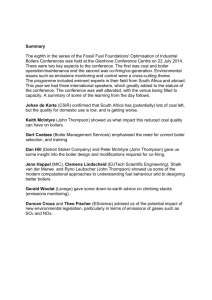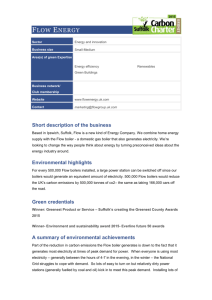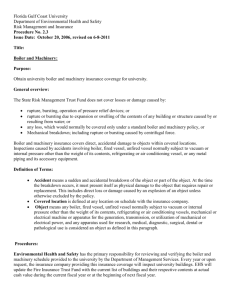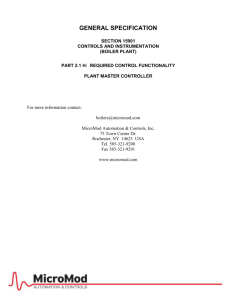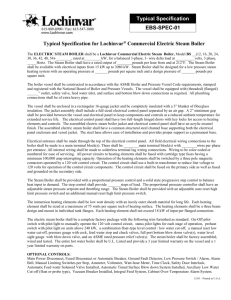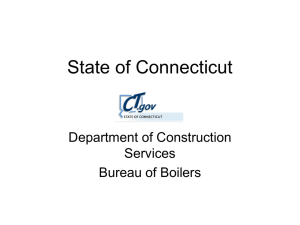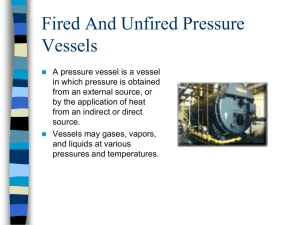Code of Practice for Owners of Boilers and Pressure Vessels
advertisement
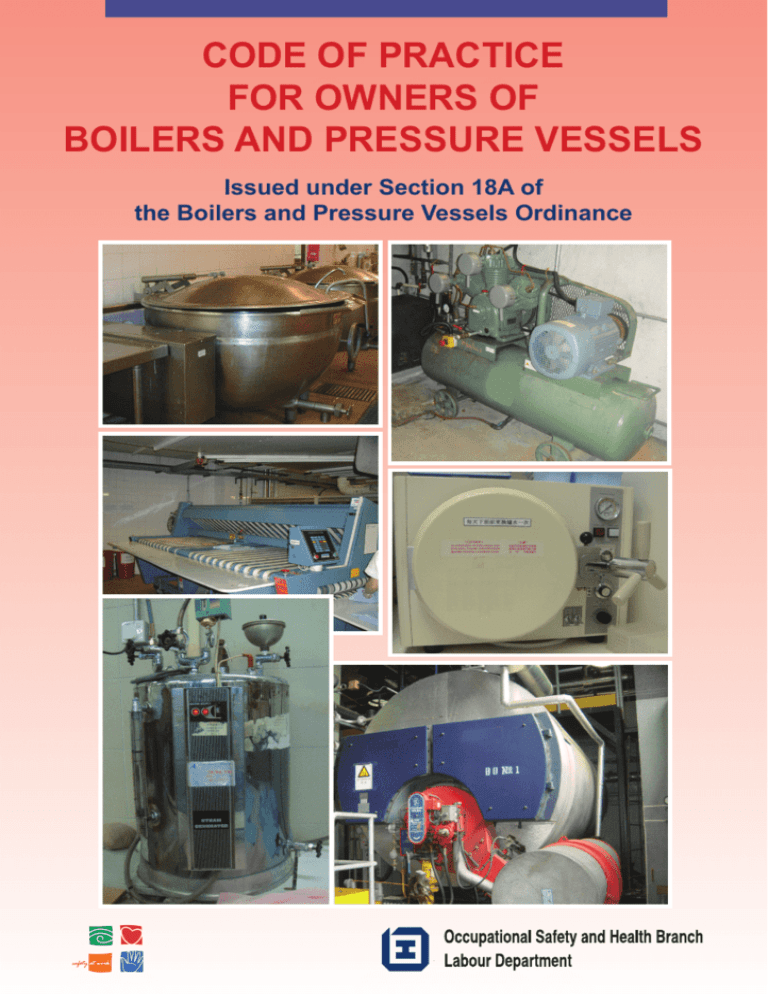
CODE OF PRACTICE FOR OWNERS OF BOILERS AND PRESSURE VESSELS Issued under Section 18A of the Boilers and Pressure Vessels Ordinance This Code of Practice is prepared by the Occupational Safety and Health Branch Labour Department This edition September 2012 This Code of Practice is issued free of charge and can be obtained from office of the Boilers and Pressure Vessels Division of the Occupational Safety and Health Branch or downloaded from website of the Labour Department at http://www.labour.gov.hk/eng/public/index.htm. Addresses and telephone numbers of the offices can be found in the website of the Department at http://www.labour.gov.hk/eng/tele/content.htm. This Code of Practice may be freely reproduced except for advertising, endorsement or commercial purposes. Please acknowledge the source as “Code of Practice for Owners of Boilers and Pressure Vessels”, published by the Labour Department. CODE OF PRACTICE FOR OWNERS OF BOILERS AND PRESSURE VESSELS Issued under Section 18A of the Boilers and Pressure Vessels Ordinance Chapter 56 Boilers and Pressure Vessels Authority Hong Kong CONTENTS Page List of Applicable Ordinance and Regulations-------------------------------------- 1 1. Introduction -------------------------------------------------------------------------- 2 2. The Ordinance ----------------------------------------------------------------------- 3 2.1 Current Legislation------------------------------------------------------------- 3 2.2 Authority and Authorized Officer-------------------------------------------- 3 2.3 Appointed Examiner----------------------------------------------------------- 3 2.4 Competent Person-------------------------------------------------------------- 4 2.5 Power of Authority to Exempt Individual Boilers or Pressure Vessels---------------------------------------------------------------- 5 3. Responsibilities ---------------------------------------------------------------------- 7 3.1 General Duties of Owners of Boilers, Pressure Vessels and Steam Containers--------------------------------------------------------------- 7 3.2 Installation of Boilers, Pressure Vessels and Steam Containers---------- 7 3.3 Maintenance and Examination----------------------------------------------- 8 3.4 Repair---------------------------------------------------------------------------- 8 3.5 Prohibition Order--------------------------------------------------------------- 9 3.6 Sale, Hire or Removal of Boilers, Pressure Vessels and Steam Containers--------------------------------------------------------------- 9 3.7 Examination After Extensive Repairs--------------------------------------10 3.8 Accidents and Defects--------------------------------------------------------10 3.9 Air Receiver and Cement Tank---------------------------------------------- 11 4. Registration -------------------------------------------------------------------------13 4.1 Registration--------------------------------------------------------------------13 4.2 Procedure-----------------------------------------------------------------------13 4.3 Change of Address------------------------------------------------------------16 4.4 Change of Ownership---------------------------------------------------------16 5.Examination -------------------------------------------------------------------------17 5.1 Maintenance and Periodic Examination of Boilers, Pressure Vessels and Steam Containers------------------------------------17 5.2 New Fuel Burning Installation-----------------------------------------------17 5.3 Portable Gas Generators------------------------------------------------------17 5.4 Auxiliary Equipment and Fittings-------------------------------------------18 5.5 Certificate of Fitness----------------------------------------------------------19 Appendix I Certificate of Competency---------------------------------------------21 Appendix II Offences and Penalties-------------------------------------------------23 Enquiry and Complaints----------------------------------------------------------------25 List of Applicable Ordinance and Regulations 1. Boilers and Pressure Vessels Ordinance, Cap. 56 2. Boilers and Pressure Vessels Regulations 3. Boilers and Pressure Vessels (Forms) Order 4. Boilers and Pressure Vessels (Exemption) (Consolidation) Order 1 1. Introduction 1.1 The Boilers and Pressure Vessels Ordinance ("the Ordinance"), Cap. 56, sets out the provisions relating to the control, use and operation of boilers and pressure vessels. 1.2 This Code of Practice ("the Code") is issued under Section 18A of the Ordinance for the purpose of ensuring acceptable standards in the design, manufacture, installation, maintenance, examination, testing and operation of boilers and pressure vessels. 1.3 Under Section 18A(2) of the Ordinance, any person who fails to observe the provisions of the Code shall not of itself render that person liable to criminal proceedings of any kind, but any such failure may, in any proceedings whether civil or criminal and including proceedings for an offence under the Ordinance, be relied upon by any party to the proceedings as tending to establish or to negative any liability which is in question in those proceedings. 1.4 All references to the "Authority" in the Code refer to the "Boilers and Pressure Vessels Authority". The Authority has issued separate Codes of Practice for different equipment controlled by the Ordinance. Owners are advised to obtain copies of the relevant Code for reference. 1.5 The Boilers and Pressure Vessels Authority, currently the Commissioner for Labour, has delegated certain powers under the Ordinance to the Principal Surveyor (Boilers and Pressure Vessels) of the Labour Department. Enquiries may therefore be directed to the Principal Surveyor or staff of Boilers and Pressure Vessels Division ("BPVD"). 2 2. The Ordinance 2.1 Current Legislation 2.1.1 The Ordinance and its Regulations deal with the installation, maintenance and inspection of boilers including thermal oil heaters, air receivers, steam receivers, steam containers, and pressurized fuel containers. The law applies to all such appliances except those used for domestic purposes and those specifically exempted. 2.2 Authority and Authorized Officer 2.2.1 The Authority and any authorized officer shall have the following powers to ascertain whether or not the provisions of the Ordinance are complied with: (a) at any time, to enter any premises or place in which he knows or has reason to believe that there is a boiler or pressure vessel; (b) at any time, to inspect, examine and test any boiler or pressure vessel and its auxiliary equipment; and (c) to require the production of any document or Certificate of Fitness in respect of the boiler or pressure vessel, and to make copies of the same. 2.2.2 Any person who wilfully obstructs or delays the Authority or an authorized officer in the exercise of any power conferred on him by the Ordinance shall be guilty of an offence and shall be liable on summary conviction to a fine of $10,000 and to imprisonment for 12 months. 2.3 Appointed Examiner 2.3.1 The boilers and pressure vessels subject to the Ordinance is 3 required to be inspected by an Appointed Examiner before first use and periodically thereafter. The Authority appoints the following categories of Appointed Examiners: (a) Boiler Inspector - for inspection and certification of any type of boilers or pressure vessels; (b) Air Receiver Inspector - for inspection and certification of air receivers. 2.3.2 An Appointed Examiner is an engineer from the private sector who has the requisite qualifications and experience and is appointed by the Authority as a Boiler Inspector or an Air Receiver Inspector. 2.3.3 Names of Appointed Examiners are published in the Gazette. A current list is obtainable free of charge from BPVD (Hotline: 2717 1771) or from the Labour Department’s website at h t t p : / / w w w. l a b o u r. g o v. h k / t c / p u b l i c / p d f / b p v d / AppointedExaminerList.pdf. 2.4 Competent Person 2.4.1 The Authority issues certificates of competency to any person who satisfies him of his suitability to operate a boiler or steam receiver. 2.4.2 The Ordinance requires that every boiler and steam receiver must be operated under the direct supervision of a Competent Person holding a suitable Certificate of Competency for that type and class of boiler or steam receiver. If a large number of such equipment is in operation at the same time, the owner must ensure that each unit can be directly supervised by a competent person. If they are in close vicinity to each other and on the same floor, one competent person may be considered acceptable. However, if they are installed at different floors, or are too far away from one another on the same floor, such 4 that one competent person cannot reasonably be expected to take care of all the working equipment simultaneously, then additional competent persons are required. Advice may be sought from an Appointed Examiner or the staff of BPVD. Failure to comply with this requirement may result in prosecution. 2.5 Power of Authority to Exempt Individual Boilers or Pressure Vessels 2.5.1 In cases where provisions of the Ordinance cannot be reasonably applied, due to the nature and construction of the boiler or pressure vessel, an Appointed Examiner may apply in writing to the Authority on behalf of the owner for exemption from any of the provisions of the Ordinance. The boiler or pressure vessel must be examined by the Appointed Examiner to ensure safe working conditions before such application is made. Any such exemption shall be subject to such conditions as the authorized officer specifies and may be withdrawn or amended at any time. 2.5.2 When considering an application for exemption, an authorized officer will consider factors including, but not limited to, capacity, operating pressure, construction, control and safety devices of the boiler or pressure vessel concerned. An exemption may be granted subject to conditions as appropriate. Such conditions may include the requirements of routine inspection, maintenance and operation of the boiler or pressure vessel and its safety devices. 2.5.3 In order to keep the exemption valid, the boilers and pressure vessels should at all times be maintained in a safe working condition and operated by persons conversant with the safety requirements relating to that particular equipment. 5 2.5.4 The Authority may by order exempt a class or type of boilers or pressure vessels from any of the provisions of the Ordinance. Such orders are gazetted and included in the Boilers and Pressure Vessels (Exemption) (Consolidation) Order, subsidiary legislation C to the Ordinance. 6 3. Responsibilities 3.1 General Duties of Owners of Boilers, Pressure Vessels and Steam Containers 3.1.1 The owner of a boiler, pressure vessel or steam container has a duty to ensure the health and safety at work of all persons employed by him. 3.1.2 The aforesaid general duties extend in particular to include the following areas: (a) Provision and maintenance of plant and systems of work that are safe and without risks to health; (b) Arrangements for ensuring safety and absence of risks to health in connection with the use, handling, storage and transport of articles and substances; (c) Provision of information, instruction, training and supervision to ensure health and safety at work of all persons employed by him; (d) Maintenance of the industrial undertaking under the proprietor's control in a condition that is safe and without risks to health; (e) Provision and maintenance of means of access to and egress from the industrial undertaking that are safe and without risks to health; and (f) Provision and maintenance of a working environment that is safe and without risks to health. 3.2 Installation of Boilers, Pressure Vessels and Steam Containers 3.2.1 Proper installation of boilers, pressure vessels or steam containers is essential to ensure safety and may have implication on the subsequent maintenance, repair and examination of the equipment. 7 Ignoring the significance of a proper installation may cause difficulty in maintenance and repair work, and even lead to an unsafe environment. Owners of boilers, pressure vessels or steam containers are advised to consult an Appointed Examiner before installing their equipment. 3.3 Maintenance and Examination 3.3.1 It is the duty of the owner to properly maintain his boiler, pressure vessel or steam container and to cause the equipment to be examined at appropriate intervals. Good maintenance will increase reliability and life of the equipment. Owners are advised to consult an Appointed Examiner for proper maintenance schemes including periodic examinations. 3.4 Repair 3.4.1 The quality of repair work carried out on a boiler, pressure vessel or steam container contributes to its safe operation. In many cases improper repair work carried out by personnel without suitable supervision had resulted in injuries. Owners are strongly advised to consult an Appointed Examiner when selecting a suitable contractor and to supervise the repair work. 3.4.2 Whenever repair is required on the pressure part of a boiler or pressure vessel, the owner should seek advice from an Appointed Examiner before the repair work is carried out. If it is an extensive repair, the boiler or pressure vessel is required to be re-examined after the extensive repair and a new Certificate of Fitness shall be issued in accordance with the relevant provisions of the Ordinance. 8 3.5 Prohibition Order 3.5.1 The Authority may, by notice in writing, prohibit any further use and operation of a boiler or pressure vessel when it appears to him that: (a) the boiler or pressure vessel or its auxiliary equipment is not in safe working order; (b) the boiler or pressure vessel or its auxiliary equipment has not been examined in accordance with the Ordinance; (c) the boiler or pressure vessel is operated at a pressure greater than its maximum permissible working pressure; or (d) the seal of the safety valve is broken or the setting of the safety valve has been tampered with by an unauthorized person. 3.5.2 Upon receipt of a prohibition order, the owner must stop using the boiler or pressure vessel concerned immediately and rectify the faults for which the prohibition order is issued. The owner should engage an Appointed Examiner to thoroughly examine the boiler or pressure vessel and obtain a new Certificate of Fitness which should be submitted to the Authority, who may permit the use of the boiler or pressure vessel to be resumed. 3.6 Sale, Hire or Removal of Boilers, Pressure Vessels and Steam Containers 3.6.1 If a boiler, pressure vessel or steam container is hired or sold, the owner must notify the Authority of the name and address of the person to whom it has been hired or sold within 7 days of the sale or the agreement for hire. Unless the boiler, pressure vessel or steam container is designed to be transportable, he must also report whether the sale or hire involves removal of the boiler, pressure vessel or steam container. 9 3.6.2 Any boiler or steam receiver which has been removed either to a new premises or to another part of the same premises must be examined by an Appointed Examiner and issued with a new Certificate of Fitness before it is put into use again. 3.6.3 The owner of a boiler, pressure vessel or steam container is required to notify the Authority if the installation address of the equipment has been changed. 3.7 Examination After Extensive Repairs 3.7.1 When extensive repairs have been carried out on a boiler or pressure vessel, the equipment and its fittings and attachments must be examined by an Appointed Examiner and issued with a new Certificate of Fitness before being put back into use. 3.8 Accidents and Defects 3.8.1 If an accident occurs involving a boiler, pressure vessel or its auxiliary equipment, or if the owner becomes aware of any such equipment that is likely to endanger life or damage property, he must at once stop using the equipment and notify the Authority of the accident or defect within 24 hours of the accident or defect together with the latest Certificate of Fitness and detailed information about the equipment and the accident or defect as laid down in Section 63 of the Ordinance. The detailed information shall include: (a) the address or place at which the boiler or pressure vessel is installed; (b) a general description of the boiler or pressure vessel; (c) the purpose for which the boiler or pressure vessel is or was used; (d) where applicable, the name and the address of the Appointed 10 Examiner who issued the latest Certificate of Fitness in respect of the boiler or pressure vessel; (e) in the case of an accident involving a boiler or pressure vessel: (i) the number of persons killed or injured, if any; (ii) details of the part thereof that failed and the extent of failure generally, if known; and (iii) the pressure at which the equipment was being operated at the time of the accident; and (f) in the case of a defect in a boiler or pressure vessel, details of the nature of the defect. 3.9 Air Receiver and Cement Tank 3.9.1 A cement tank designed to utilize compressed air to blow out the contents during discharge or purge is within the meaning of an air receiver and is subject to the same provisions that apply to air receiver in the Ordinance. 3.9.2 Owners of air receivers are advised to observe the following safe practices: (a) An air receiver should be protected by paint and kept away from hazardous environment such as hot furnace, dripping water pipe etc. to prevent it from potential damage and accelerated deterioration. (b) An air receiver should have adequate provisions to allow any condensation of moisture inside the receiver to be drained away easily. It should also be drained empty of moisture condensation regularly. (c) The inside of an air receiver should be thoroughly cleaned periodically, in particular for inspection by an Appointed Examiner. 11 3.9.3 Since a cement tank is opened frequently by the operator for inspection of the contents after discharging, it should be fitted with: (a) a suitable safety locking device, approved by the Authority, at the manhole door to prevent the door from being opened if the pressure inside the tank has not been completely released; and (b) a warning notice, in English and Chinese, near the manhole doors stating that the operator must not open the door until the pressure inside the tank has been completely released. 12 4.Registration 4.1Registration 4.1.1 No boiler, pressure vessel or steam container may be used or operated unless: (a) it is registered under the Ordinance; and it has been examined and issued with a Certificate of Fitness (*Certificate of Fitness is not required for steam container); or (b) it has been exempted by the Authority from the relevant provisions of the Ordinance. The above requirements do not apply to boilers, pressure vessels or steam containers: (a) belonging to the State; (b) being used solely for domestic purposes; (c) being part of the fixed equipment of a vessel or other floating craft; (d) being used as part of an equipment for supplying locomotive power to a vehicle; (e) being used for operating the ancillary equipment of a vehicle for the carriage of passengers or goods. 4.2Procedure 4.2.1 The application form for registration may be obtained free of charge on request from the Authority. 4.2.2 The owner of a new boiler or pressure vessel, other than a pressurized fuel container, must deliver to the Authority, not less than 30 days before the boiler or pressure vessel is put into use, the completed application form and the following: (a) one copy of the maker's certificate and one copy of the certificate 13 of inspection during construction issued in respect of the boiler or pressure vessel by a recognized inspection body; or (b) documentary evidence, to the satisfaction of the Authority, that the boiler or pressure vessel complies with a recognized engineering standard or code in respect of: (i) the welders employed and welding procedures used in the construction, erection and repairs of the boiler or pressure vessel; (ii) heat treatment before and after welding; (iii) tests and inspections carried out on the boiler or pressure vessel; and (iv) any other relevant technical details that the Authority may specify, e.g. the kind and grade of material used in the pressure parts of the boiler or pressure vessel; or (c) if the owner cannot deliver the documents referred to in paragraph (a) or (b) above, details of the design and methods of construction, inspection and testing of the boiler or pressure vessel and its auxiliary equipment. 4.2.3 The owner of a new steam container must deliver to the Authority, not less than 30 days before the steam container is put into use, the completed application form and two copies of the maker's certificate or two copies of the plan of the steam container prepared by a Boiler Inspector. 4.2.4 Every copy of the above documents delivered to the Authority must have a declaration on it by an Appointed Examiner that it relates to the boiler or pressure vessel in respect of which it is so delivered. The Appointed Examiner shall determine the maximum permissible working pressure for the boiler or pressure vessel and state the same in the documents accompanying the application for registration. 14 Where any document is not written in English or Chinese, it should be accompanied by an English translation. 4.2.5 If the documents are not produced or do not give the Authority sufficient information to enable him to assess the maximum permissible working pressure, he may require the owner to have the boiler or pressure vessel inspected by an Appointed Examiner at the owner's expense. 4.2.6 When the Authority is satisfied with the application he will notify the owner in writing of the registration number and the maximum permissible working pressure of the boiler, pressure vessel or steam container. The owner shall engrave, impress or incise the registration number onto a conspicuous place on the boiler, pressure vessel or steam container. 4.2.7 If the Authority is not satisfied that the application meets the requirement for registration, one copy of the documents with reasons for refusal of registration will be returned to the owner. The owner may re-apply after rectifying the deficiencies indicated. 4.2.8 The boiler or pressure vessel must be examined and issued with a Certificate of Fitness by an Appointed Examiner before it is put into use. 4.2.9 Where an owner is aggrieved by the decision of an Appointed Examiner as to the maximum permissible working pressure at which his boiler or pressure vessel may be operated, he may appeal to the Authority in writing not later than 7 days after he was notified of the decision. The decision on the appeal by the Authority shall be final. 15 4.3 Change of Address 4.3.1 The owner of a registered boiler, pressure vessel or steam container shall, within 7 days of the change, notify the Authority of any change in his/her address. 4.4 Change of Ownership 4.4.1 On any change of ownership of a registered boiler, pressure vessel or steam container, the former owner is required to notify the Authority of the change in ownership (see paragraph 3.6.1). 16 5. Examination 5.1 Maintenance and Periodic Examination of Boilers, Pressure Vessels and Steam Containers 5.1.1 Every boiler, pressure vessel and steam container and its auxiliary equipment shall be properly maintained and operated in a safe working condition at all times. In particular, the owner should ensure that: (a) the boiler or pressure vessel has been properly examined by an Appointed Examiner before the current validity of the Certificate of Fitness expires. (b) the permanent outlet from any steam container to the atmosphere must be open and free from obstruction at all times; (c) a boiler room must be maintained in a clean condition and be free from defective joints, oily waste or other inflammable material; and (d) the fire fighting appliances provided in connection with a boiler or its auxiliary equipment must be properly maintained and kept in a readily accessible place. 5.2 New Fuel Burning Installation 5.2.1 Every new fuel burning installation fitted to a boiler must be examined by an Appointed Examiner before it is put into use. 5.3 Portable Gas Generators 5.3.1 Any person who wishes to use a portable gas generator must apply in writing to the Authority. The Authority may grant such permission subject to such conditions as to the operation, maintenance, 17 inspection or otherwise of the equipment as the Authority considers necessary. 5.4 Auxiliary Equipment and Fittings 5.4.1 The Regulations set out the necessary auxiliary equipment and fittings to be fitted on each type of boiler and pressure vessel. An owner should consult an Appointed Examiner to ensure that his boiler or pressure vessel is fitted with the necessary auxiliary equipment/ fittings. Failure to comply with the requirements may result in prosecution of the owner. 5.4.2 Safety valve(s) fitted on a boiler, steam receiver or air receiver must be so adjusted as to prevent the equipment from being operated at a pressure greater than the maximum permissible working pressure specified in the valid Certificate of Fitness. The safety valve must be sealed by an Appointed Examiner to prevent the equipment from being operated at a pressure greater than its maximum permissible working pressure. The setting of the safety valve must not be altered by an unauthorized person. 5.4.3 Every pump, heater, strainer and furnace mouth in a fuel burning installation must be fitted with ‘save-alls’ or oil gutters. 5.4.4 Every pipe that conveys oil, steam or water under pressure to or from a boiler, steam receiver or steam container must be protected against the effect of weather, damp and external damage. The pipe which conveys oil or steam under pressure must also be properly lagged with fire-proof insulation material. 5.4.5 Each boiler, pressure vessel or steam container shall bear an easily visible registration number. 18 5.5 Certificate of Fitness 5.5.1 Before putting a boiler or pressure vessel into use, the owner must ensure that there is a valid Certificate of Fitness and that it is not under a prohibition order issued by the Authority. 5.5.2 The Ordinance prescribes the conditions for issue by an Appointed Examiner of a Certificate of Fitness in respect of a boiler or pressure vessel and makes provision for appeal against refusal to issue such a certificate. If the Appointed Examiner is satisfied with the conditions of the equipment which he has examined, he must issue a Certificate of Fitness in a prescribed form and deliver 2 copies of the Certificate to the owner. The owner must then deliver these copies to the Authority within 7 days after the copies are delivered to him. The latest Certificate of Fitness or a copy thereof must be kept and displayed in a prominent position at the premises where the boiler or pressure vessel is installed. 5.5.3 In case the Appointed Examiner refuses to issue a Certificate of Fitness in respect of a boiler or pressure vessel, the owner who considers himself aggrieved may appeal to the Authority in writing within 7 days after the day on which the examiner notified him of the refusal. The decision of the Authority shall be final. 5.5.4 In case a boiler or pressure vessel cannot be shut down for an examination as required by the Ordinance because of operational requirements, the owner may apply in writing to the Authority for extension of the expiry date of the Certificate of Fitness. Adequate reasons to support his application must be given together with a report from an Appointed Examiner to the effect that he has examined 19 the boiler or pressure vessel while in operation and is satisfied that the boiler or pressure vessel could continue to operate safely within the extended period, and beyond which the boiler or pressure vessel must be examined. 5.5.5 If the Authority is satisfied with the application and the report, he may by notice in writing to the owner, extend the validity of the Certificate for such a period as he considers fit, but in any case not exceeding 6 months. 20 Appendix I Certificate of Competency The following are examples of the types of equipment which the holders of different Certificates of Competency are allowed to operate: CERTIFICATE OF COMPETENCY A) All Classes (I to VI) TYPE OF BOILER/STEAM RECEIVER FOR WHICH THE CERTIFICATE IS VALID i) All Boilers (including automatically controlled with superheaters) and ii) Steam Receivers B) Class I i) All Water-tube Boilers (including automatically controlled with superheaters) and ii) Steam Receivers C) Class I(A) i) Water-tube Boilers (including automatically controlled but without superheaters) and ii) Steam Receivers D) Class I(B) i) Manually Controlled Water-tube Boilers (without superheaters) and ii) Steam Receivers E) Class II i) All Fire-tube Boilers (including automatically controlled) and ii) Steam Receivers F) Class II(A) i) Automatic Fire-tube Boilers and ii) Steam Receivers 21 G) Class II(B) i) Manually Controlled Fire-tube Boilers and ii) Steam Receivers H) Class III i) All Electrically Heated Boilers (including automatically controlled) and ii) Steam Receivers I) Class III(A) i) Manually Controlled Electrically Heated Boilers J) Class IV i) Sterilizing and Vulcanizing Boilers K) Class V i) Special Purpose Boiler as specified L) Class VI i) Steam Receivers Certificates of Competency issued before the year 1981, namely the B & S certificate, shall remain valid for the type of equipment as specified in the certificate. Any person who has any query about such certificates should consult BPVD of the Labour Department. 22 Appendix II Offences and Penalties Contraventions of any of the following provisions under the Ordinance and the Regulations is an offence and is liable to the prescribed penalty as briefly summarised below: Section 15A Failure to submit an application for registration. Maximum fine:- $10,000 [Level 3 of Schedule 8 to the Criminal Procedure Ordinance, Cap.221] Section 22 Failure to ensure the proper maintenance of a boiler or a pressure vessel and its auxiliary equipment. Maximum fine:- $25,000 [Level 4 of Schedule 8 to the Criminal Procedure Ordinance, Cap.221] Section 49(1) Operating a boiler or pressure vessel not having been examined in accordance with the Ordinance. Maximum fine:- $50,000 [Level 5 of Schedule 8 to the Criminal Procedure Ordinance, Cap.221] Section 49(4) Operating a boiler or pressure vessel at a pressure greater than its maximum permissible working pressure. Maximum fine:- $50,000 [Level 5 of Schedule 8 to the Criminal Procedure Ordinance, Cap.221] Section 49(6) Using or operating a boiler or pressure vessel whilst an order issued by the Authority is in force prohibiting such use and operation. 23 Maximum fine:- $50,000 [Level 5 of Schedule 8 to the Criminal Procedure Ordinance, Cap.221] Section 49(7) Operating a boiler or steam receiver without the direct supervision of a competent person. Maximum fine:- $50,000 [Level 5 of Schedule 8 to the Criminal Procedure Ordinance, Cap.221] Section 55 (1)(d) Utters or makes use of a certificate of fitness or a certificate of competency or any such notice, form or document knowing the same to be forged or false in a material particular. Maximum penalty:- a fine of $10,000 [Level 3 of schedule 8 to the Criminal Procedure Ordinance, Cap.221] and imprisonment for 12 months Section 56 Corruptly solicits or receives any gift, loan, fee, reward or advantage whatsoever as an inducement for certification or forbearing to make any report or notification required to be made under the Ordinance. Maximum penalty:- a fine of $50,000 [Level 5 of schedule 8 to the Criminal Procedure Ordinance, Cap.221] and imprisonment for 5 years Regulation 4(1)( a) Steam receiver not fitted with suitable steam reducing valve. Maximum fine:- $10,000 [Level 3 of Schedule 8 to the Criminal Procedure Ordinance, Cap.221] 24 Enquiry For more information about the regulation of boilers and pressure vessels, please contact the Boilers and Pressure Vessels Division of the Labour Department through:Telephone : 3107 3458 Fax : 2517 6853 / 2517 0875 E-mail: enquiry@labour.gov.hk Information on the services offered by the Labour Department is available on its website at http://www.labour.gov.hk. Complaints If you have any complaints about boilers and pressure vessels, please call the Labour Department’s Boilers and Pressure Vessels Division complaint hotline 3107 3462. All complaints will be treated in the strictest confidence. 25 Occupational Safety and Health Branch Labour Department Published by the Labour Department Printed by the Government Logistics Department 9/2012-4-BPVB9

